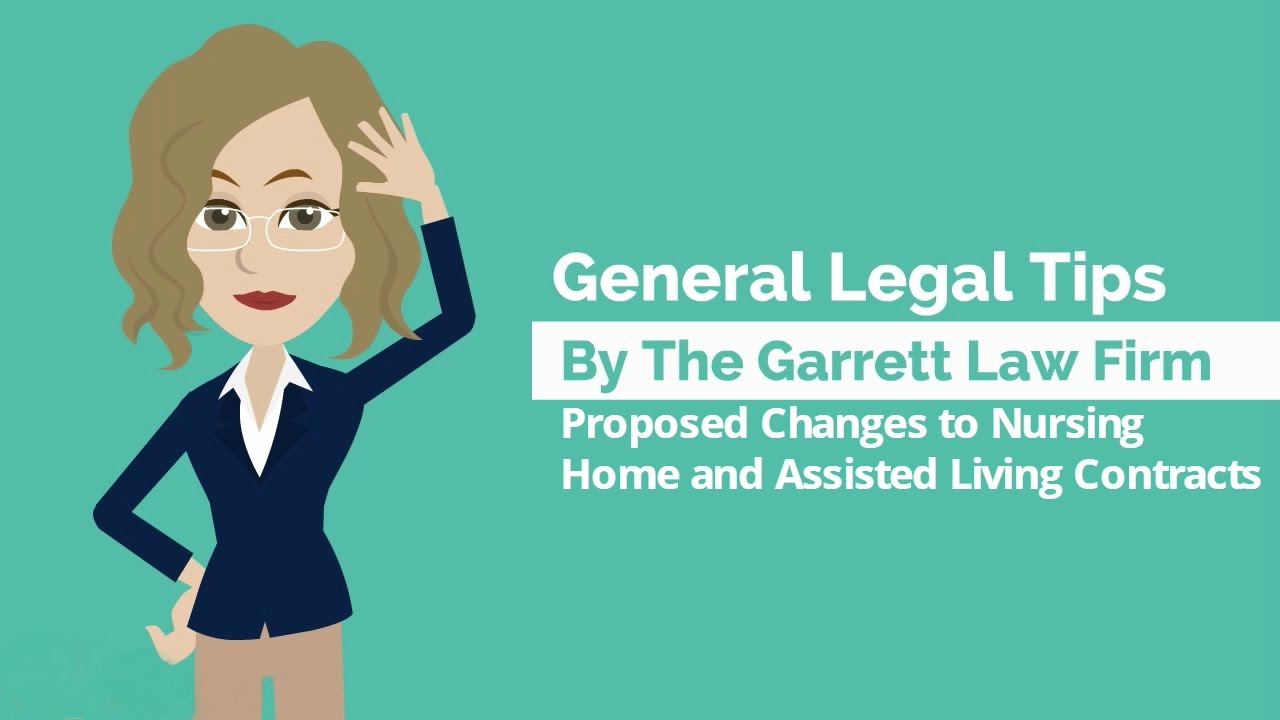Proposed changes Nursing Homes and Assisted Living Contracts
Hello, and welcome to News from the Legal World, presented by the Garrett Law Firm.
In this video, we will be talking about nursing home and assisted living contracts.
“For the first time since 1991, CMS, the Center for Medicaid and Medicare Services, has passed changes to the regulations governing nursing homes and assisted living facilities which accept Medicaid and Medicare. About 97 percent do. Comments on the 430 pages of proposals focus on three main areas of controversy.
These highlight areas on which prospective residents and their families should focus when considering a nursing home, assisted living, or other long-term care facility. First, these businesses, and they are businesses, have long been trying to get more than Medicaid or Medicare pays by sneakily getting family members to sign something that leaves them to foot the bill at the higher, unregulated, private payer rate. Family members should be careful to only sign as the personal representative of the person being admitted. They should never agree to be responsible for payments or for applying for Medicaid or Medicare.
They should never let themselves be tricked into signing a power of attorney, which must be signed by the person granting the power and which some facilities use to defraud Medicaid.
Second, prospective residents and their families do not realize that the contracts are negotiable and, without realizing it, waive important legal rights. Among these are the right to sue.
Nursing homes and other long-term care facilities are happy with a pre-dispute arbitration agreement. You should not be.
In doing this, you give up the right to obtain documents and question people. You give up the right to due process and a fair trial before an impartial judge. You give up the right to a jury.
The widespread practice of including agreements to arbitrate throws a cloak of invisibility over bad practices making it impossible for people to truly compare facilities and know what kind of care they or their loved ones can actually expect. Third, more frequent health emergencies are just part of life in a nursing home or other long-term care facility. People live there because their health has deteriorated.
When should they be taken to the hospital? Today, there seem be too many unnecessary calls to 9-1-1. Too many unnecessary emergency hospitalizations. In many cases, nursing homes and other long-term care facilities call 9-1-1 to avoid potential liability when they could have easily had a doctor or a nurse practitioner or an RN examine the patient first.
In others, particularly in rural areas, this is impractical. The nearest competent health care professional is hours away.
When you are evaluating a facility, read the contract, often called the resident’s agreement. Learn what the facility’s practice is. Decide whether you are comfortable with it.
For more information about evaluating nursing homes, assisted living, and other long-term care facilities, see www.elderlawaustin.com or give us here at The Garrett Law Firm, PLLC in Austin, Texas a call at (512)-800-2420.
=====================================================
Be sure to SUBSCRIBE to my youtube channel at
https://www.youtube.com/channel/UC5O1rn2jY3zVv3oj4wwWA_A
=====================================================
Unlock your future. Visit my website at
=====================================================
Receive a free eBook: In Sickness and In Health. Take care of yourselves in sickness and in health. Secure your well-being and that of those you love. Download this FREE eBook now.
http://eepurl.com/bKE8sL
=====================================================
The Garrett Law Firm, PLLC
Facebook:https://www.facebook.com/TheGarrettLawFirm/
LinkedIn: https://www.linkedin.com/in/terry-garrett-b906159a/
=====================================================
